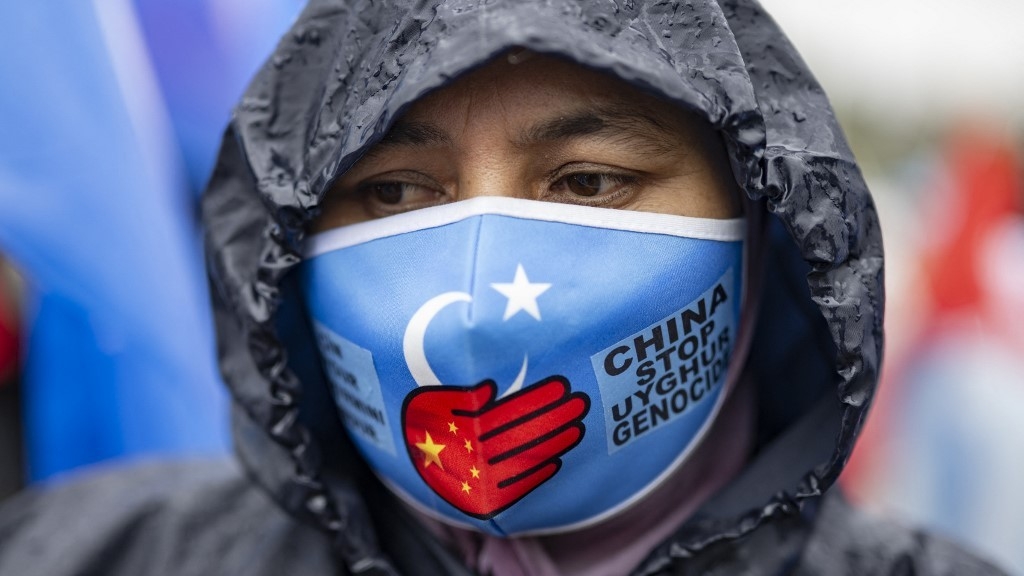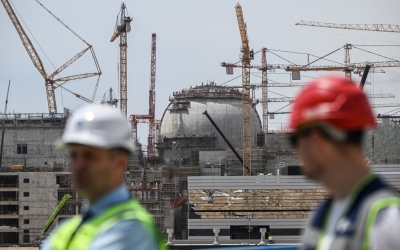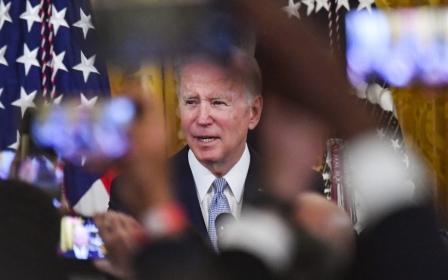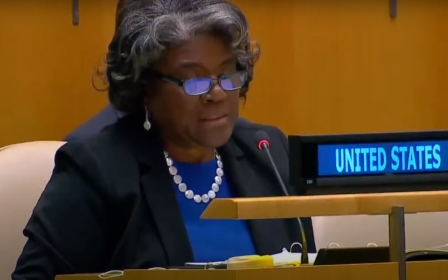Turkey quietly lobbied for Uyghur rights during high-level visit to China

Turkish Foreign Minister Hakan Fidan quietly lobbied for the protection of Uyghur minority rights and culture during his visit to China earlier this week, two Turkish officials told Middle East Eye.
In Beijing, Fidan met with his Chinese counterpart, Wang Yi, and Vice President Hang Zheng.
Fidan also travelled to the Xinjiang Autonomous Region, marking the highest-level visit to the Uyghur region since 2012. While meeting with officials and Uyghurs in Urumqi and Kashgar, Fidan sported a turquoise tie, a colour associated with Uyghur national flags, and referred to the cities as “ancient Turkish-Islamic cities” that connect China to the Turkic and Islamic worlds.
However, Fidan’s failure to criticise China's well-documented mistreatment of its Uyghur minority, including the detainment of thousands of people in what China calls “reeducation camps”, triggered online condemnation from some Uyghur groups.
A 2022 UN human rights report accused China of committing crimes against humanity over its treatment of Uyghurs.
New MEE newsletter: Jerusalem Dispatch
Sign up to get the latest insights and analysis on Israel-Palestine, alongside Turkey Unpacked and other MEE newsletters
Two Turkish diplomatic sources revealed that Ankara stressed the importance of the Uyghur issue to Beijing. “[We told them that] Uyghur Turks, with whom we have ethnic, religious and cultural ties, are very important to us,” one diplomatic source said.
“We told them, you know, the sensitivities of the Turkish world and the Islamic world regarding the protection of the cultural rights of the Uyghur Turks and the practice of their values.”
The source added that while Ankara respects China’s sovereignty and supports the one-China policy, it also believes addressing concerns over Uyghur rights is essential.
“We told them that completely eliminating the reasons that worry the Turkic and Islamic world regarding the Uyghurs will be of great benefit to everyone,” the source said. “Changing the perception on this issue will only be possible with the steps taken by China.”
Chinese officials 'agitated'
Fidan’s visit to the Xinjiang Autonomous Region was also criticised for being choreographed by Chinese officials. The second Turkish official said Ankara accepted Beijing’s offer to observe the situation in the Uyghur for the purpose of “clearly conveying our opinions to the official authorities there”.
During a joint press conference with Wang Yi, Fidan reiterated that Turkey opposes any terrorist activities in China, supports the country’s territorial integrity, and respects China’s growing influence in the region. However, his comments on Urumqi and Kashgar, calling them Turkish and Islamic cities, may have unsettled Chinese officials.
“The statement has potentially agitated some Chinese officials as far as I gather from my contacts,” said Diren Dogan, a visiting researcher at Oxford University. “Calling these cities Turkish and Islamic is completely inconsistent with the Chinese official line, but Fidan’s stance against terrorism and his support for the one China policy probably balanced the possible negative reactions.”
Dogan noted that Turkey finds itself in a dilemma, wanting to maintain its diplomatic and trade relationship with China while also standing up for Uyghur rights and freedoms.
The second Turkish official source stated that bilateral relations have stagnated since a Chinese consortium abandoned a project to buy shares in Istanbul’s third bridge for nearly $700m in 2021 and the resignation of former Finance Minister Berat Albayrak in 2020, who was a strong supporter of a pro-China policy.
Sources in Ankara mentioned that the postponement of Chinese Covid-19 vaccine deliveries in March 2021 marked another low point in the relationship, with Beijing reportedly asking for the extradition of several Uyghur dissidents from Turkey to China as a gesture. “Turkey has denied these requests,” a separate source said.
Reviving Turkey-China relations
According to a foreign official, Fidan has been looking for ways to rekindle Turkey's relationship with China in recent months, as Ankara cannot ignore China's growing diplomatic and military power.
“This was an attempt to invite China to revive the relationship of mutual respect and interest,” the second Turkish official said. “We ask them to lift restrictions on Turkish agricultural exports and allow more Chinese tourists in Turkey to balance the trade deficit, which is more than $40bn in China’s favour, and more Chinese investments.”
Ankara also wants China to build a nuclear power plant in the west of Turkey, but Beijing has so far avoided making a final commitment despite participating in comprehensive discussions with Turkish officials on the project.
“You cannot secure Chinese investment in a nuclear project unless there is a solid political rapport between the two governments," one consultant, who wished to remain anonymous, told MEE.
Earlier this month, Turkish Energy Minister Alparslan Bayraktar signed a memorandum of understanding with his Chinese counterpart on rare earth minerals and nuclear energy during his official visit to Beijing.
Dogan added that any nuclear power plant agreement must be finalised between Turkish President Recep Tayyip Erdogan and Chinese President Xi Jinping.
Fidan has extended an invitation to Xi Jinping for an official visit to Turkey later this year, but it is unclear if the Chinese president will accept.
During his visit to China, Fidan also emphasised the importance of the so-called Middle Corridor for both China and Turkey and requested more commercial flights between the countries, including to Urumqi, according to a second Turkish official.
During a joint press conference, Chinese Foreign Minister Wang Yi said that China is willing to collaborate with Turkey on the Middle Corridor and to expand imports of high-quality agricultural products from Turkey.
“The US-backed India-Middle East-Europe-Economic Corridor (IMEC) bypasses Turkey and China and encourages both countries to work together through the Middle Corridor and Iraq Development Road, which could be connected to the Middle Corridor,” said Dogan.
“In terms of creating a pathway between Turkey and China, I think this visit succeeded,” Dogan added.
Middle East Eye delivers independent and unrivalled coverage and analysis of the Middle East, North Africa and beyond. To learn more about republishing this content and the associated fees, please fill out this form. More about MEE can be found here.





